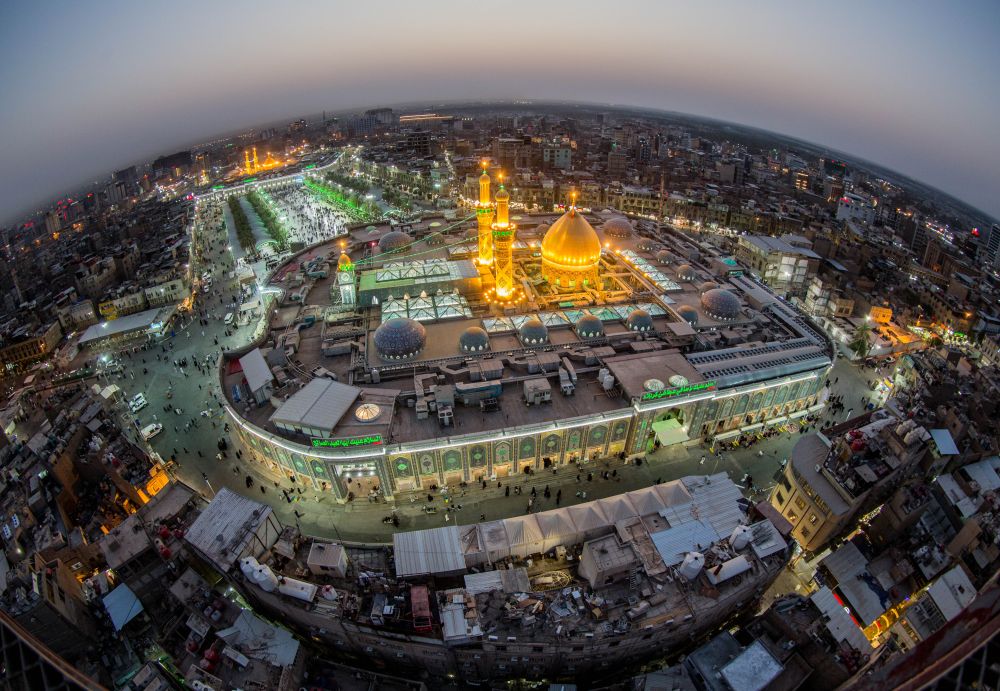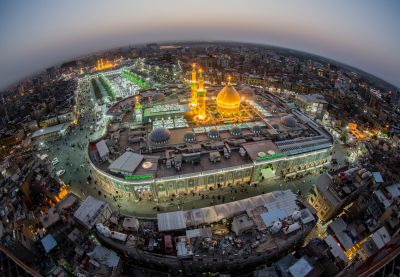

The Imam Hussain Shrine is a site of extraordinary historical and spiritual significance, drawing millions of pilgrims annually. This stunning complex is dedicated to Hussein ibn Ali, the grandson of the Islamic prophet Muhammad, who was martyred during the Battle of Karbala. Visitors are captivated by the mosque’s intricate architecture, with its gold-domed sanctuary and two tall minarets. Both the exterior and the interior of the shrine are adorned with ornate Islamic calligraphy and brilliant mirror work, creating a mesmerizing ambiance. The shrine is an oasis of tranquility and reverence, providing an opportunity to gain insight into Islamic history and culture. While there, individuals can also partake in traditional mourning ceremonies or learn about the events that took place in Karbala.
Al Abbas Mosque is a prominent religious site in Karbala, Iraq, known for its unique history and architectural beauty. This mosque is dedicated to Al-Abbas ibn Ali, known for his loyalty and valor during the Battle of Karbala. When visiting the mosque, guests are struck by the magnificent golden dome and the equally resplendent twin minarets that frame the sacred structure. Inside, the mosque boasts intricate designs, with walls and ceilings embellished with Islamic calligraphy and delicate glass work that reflect spiritual significance. Those interested in history will find the exhibits on the life and legacy of Al-Abbas compelling, while the serene atmosphere offers a space for visitors to reflect and pay their respects.
Karbala’s Old City is a labyrinth of history, where travelers can meander through narrow alleyways and bustling markets that have been part of the city's fabric for centuries. Here, you can witness a vibrant array of street scenes and daily activities that reflect the city's rich culture. The marketplace is alive with the sounds of merchants and the scents of local cuisines, offering an immersive experience into the traditions of Iraq. While exploring, shoppers can purchase unique souvenirs, such as traditional handicrafts, religious relics, and aromatic spices. Marvel at the historical buildings and take in the old-world charm that is palpably felt throughout the mazy streets of Karbala's Old City.
Arbaeen marks one of the world’s largest annual gatherings, as millions of pilgrims descend upon Karbala to commemorate the 40th day after the martyrdom of Imam Hussain. This pilgrimage is a powerful display of faith and solidarity, where the streets of Karbala are filled with the solemn yet hopeful procession of the faithful. Many travelers participate in the pilgrimage to pay homage to Imam Hussain, share in moments of collective prayer, and experience the profound spirituality that pervades the city during this time. The event also features religious lectures, communal meals, and acts of charity, fostering a profound sense of community and spiritual kinship among the participants from across the globe.
The Karbala Museum is a treasure trove of history that showcases the heritage of the city and the wider region. Visitors to the museum can delve into exhibits that feature artifacts from different periods, ranging from ancient Mesopotamian civilizations to the modern day. Notable displays include manuscripts, traditional clothing, and items associated with the events of Karbala. In addition to historical artifacts, the museum offers multimedia presentations that enrich visitors' understanding of the socio-cultural development of Karbala and its significance in Islamic history. Friendly guides are available to provide deeper insights, making this an educational experience for history enthusiasts and casual visitors alike.
Embarking on a Tigris River cruise offers a refreshing perspective on the landscapes around Karbala. As guests float down the river that has been a lifeline for Mesopotamian civilizations for millennia, they can appreciate the natural beauty and serene atmosphere away from the city's hustle. The cruise typically includes a guide who highlights significant historical sites and natural features along the riverbanks. It's an ideal activity for those seeking a blend of relaxation and sightseeing. While on board, one can also enjoy traditional Iraqi cuisine and interact with locals, making for an authentic cultural experience.
Karbala's culinary scene provides a delectable insight into traditional Iraqi cuisine. Food enthusiasts can venture into local eateries that serve up a variety of dishes, such as masgouf (grilled fish), kebabs, and dolma (stuffed vegetables). Restaurateurs often share stories about the origins of the dishes, and some establishments may offer cooking demonstrations. Beyond the food, the ambiance of traditional restaurants, with their ornate decor and welcoming staff, adds to the dining experience. Sampling local breads and sweets is also a must-do, and the aromatic Iraqi tea offers the perfect ending to a sumptuous meal.
